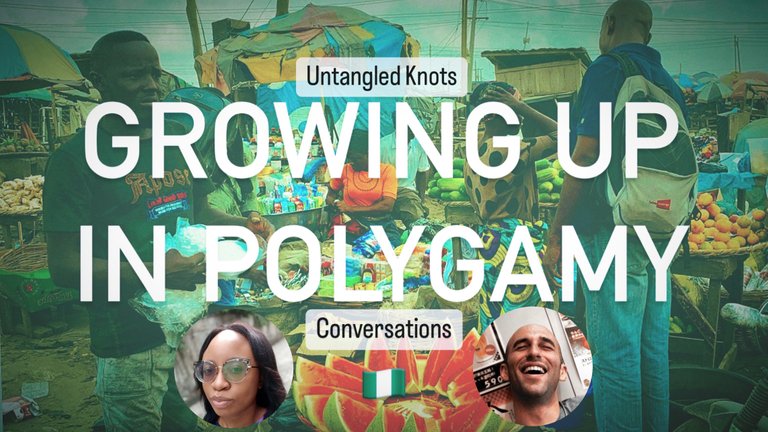This is the new podcast format. Hope you like it!
What’s considered normal varies from place to place. In some countries, it’s normal to have 1 kid, in others, it’s normal to have 33. I talk to Karina about polygamy in Nigeria and what it’s like having such a huge family.
When I can finally travel to Africa I want to stop in Nigeria. For all it’s problems, there are a ton of interesting people there with amazing stories. I don’t mind this kind of culture shock one bit.
Newest episode:

▶️ 3Speak
My grandfather had over 109 kids
Polygamy is crazy.
My grandfather had over 109 kids
Polygamy is crazy.
The motivation for giving birth to a lot of kids is indiscipline.
I can't understand why someone will give birth to 9.
Although, mothers who gave birth to just one tend to want many grand children.
For example, I am the only child of my mom and my mother wants me to have six children.
I told her she was on her own.
I am yet to give her one
I can imagine the indiscipline or just hormonal drive but why do they want so many grandkids? Isn't 3 or 4 enough? I guess I've never been anywhere where people like kids THAT much. I thought Karina's answer was funny: boredom 😆. I've also yet to produce any. We will see.
!!!!’ I have no words! The concept of family must be so different! Wow! 😮 thanks for sharing!
!PIZZA
Thanks for the slice of pizza
PIZZA Holders sent $PIZZA tips in this post's comments:
@selfhelp4trolls(1/15) tipped @bhoa (x1)
Please vote for pizza.witness!
Whoooooooo the editing were top notch and it was amazing how you managed to stabilize the video very well and I think the pattern to the new podcast is more attractive. The SEO is great as well, let's see how this goes because that topic seem to be Nigerian friendly.
@tipu curate 2
Upvoted 👌 (Mana: 25/45) Liquid rewards.
This was interesting question and footage. Reminds me that I should do mine but cause my phone broke, everything is halted. I hope to record one soon, just not sure where to, maybe Malioboro haha
Here is a detailed summary article about the episode transcript:
Exploring the Cultural Norms Around Large Families in Nigeria
In this insightful discussion, the hosts delve into the cultural practices surrounding large families, particularly in Nigeria. The conversation begins with one host expressing surprise at the high number of children some Nigerians have, likening it to "chickens." The other host explains that having a large number of children, sometimes over 30, was historically common among wealthy Nigerian men who could afford multiple wives.
The host shares that their own grandfather, a successful fisherman, had around 33 children from various wives. This practice, known as polygamy, was seen as a sign of wealth and status, with the number of children a man had directly correlating to his affluence. The host notes that their grandmother was essentially a "gift" from a friend of their grandfather, highlighting the transactional nature of these marriages.
The discussion then shifts to explore the regional differences in these cultural norms. The host suggests that while large families are common across Nigeria, the practice seems more prevalent in the southern regions of the country. They speculate that the lack of resources and poverty in some areas may contribute to this, with families having children they cannot adequately support.
The hosts also touch on the preference for male children, which is still prevalent in some Nigerian communities. The host shares a personal anecdote about a cousin who kept having children until she finally gave birth to a son, despite already having eight daughters.
Comparing this to the cultural norms in other countries, the hosts discuss how the motivations for large families can vary. In China, for example, the idea was that having many children increased the chances of one becoming successful and supporting the family. In contrast, the host suggests that in Nigeria, boredom and a lack of alternative activities may contribute to the high birth rates, particularly in impoverished areas.
The conversation concludes by acknowledging the changing attitudes towards family planning, with younger generations in Nigeria and other parts of the world becoming more conscious of the financial and practical challenges of raising large families. The hosts recognize that while these cultural practices were once deeply ingrained, societal shifts are leading to a gradual decline in the prevalence of large families.
Conclusion
This episode provides a fascinating glimpse into the cultural norms and historical practices surrounding large families in Nigeria. The hosts offer personal anecdotes and insights that shed light on the complex social and economic factors that have shaped these traditions over time. By exploring the regional differences and evolving attitudes, the discussion offers a nuanced understanding of this aspect of Nigerian society.